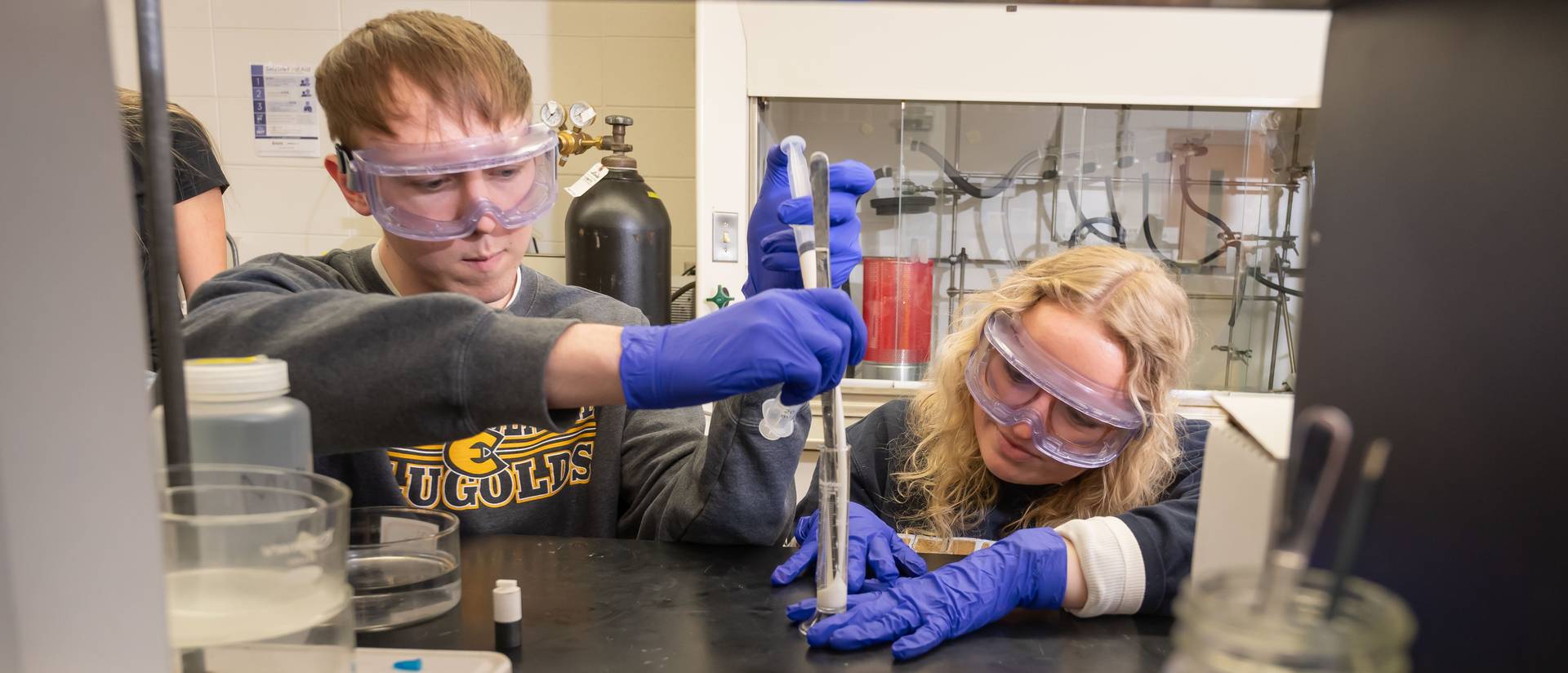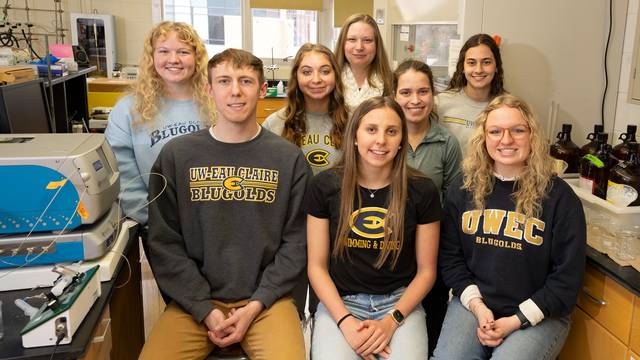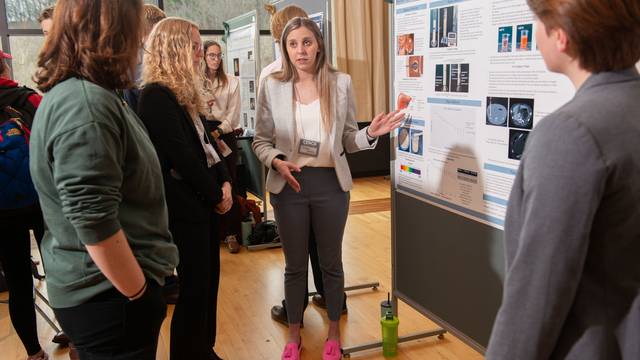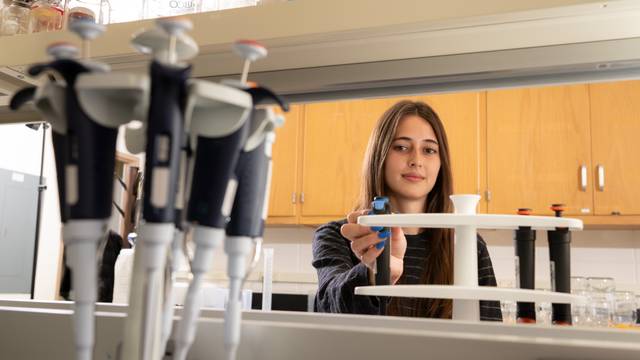As if the final commencement ceremony to take place in Zorn Arena isn’t reason enough to be celebrated, the May 18 ceremony also marks the graduation of the first cohort of Blugold Biomedical Innovator Scholars.
Eight biomedical scholars will accept their degrees this month having completed four years of groundbreaking undergraduate biomedical research in collaboration with physicians and researchers from Mayo Clinic Health System. One additional student graduated from the program in December 2023 and is recognized here.
As the inaugural recipients of UW-Eau Claire’s first-of-its-kind four-year scholarship in 2020, these graduates have not only taken part in pioneering research and hands-on clinical and practical Mayo-based experiences, but they did so as incoming first-year students starting college under the constraints of a global pandemic.
“We launched the program in the first full semester of COVID, when we were still trying to figure out which end was up,” says Dr. Michael Carney, interim provost, vice chancellor for academic affairs and program co-founder.
Despite having only virtual or hybrid classes with alternating in-person days, physical distancing and masking, Carney says that faculty and Mayo collaborators adapted original program plans and applied the term “innovator” in the program name.
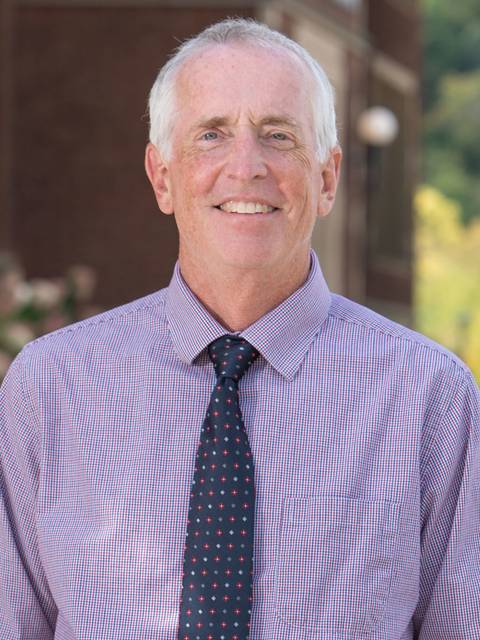
Dr. Michael Carney, interim provost, vice chancellor for academic affairs and program co-founder
“We couldn’t even think about going into hospitals,” Carney says about original plans for scholars to regularly attend hospital grand rounds and other interactions on-site at Mayo in Eau Claire.
“One of the few things we could do was research, albeit with masks and physical distancing,” Carney says. “Still, the research teams made it work, thanks to our faculty mentors who have been incredible throughout the entire life of this program. The teams made great progress under less-than-ideal conditions and the cohort bonded in ways that I couldn’t have imagined.”
The main program goal from the start has been to research problems that are currently impacting patient care and outcomes, and Carney is thrilled to see how the projects of this cohort have succeeded in meeting this goal.
“The problems are big and the needs are great, so there is a sense of urgency to find solutions,” Carney says.
“These students have sought answers to things like improving patient outcomes in cancer ablation procedures; 3D printing a patient’s actual heart to help guide surgical planning for valve replacement; and the use of artificial intelligence to detect long-forgotten filters placed in veins to stop clots from entering the lungs. It’s remarkable what they’ve contributed to.”
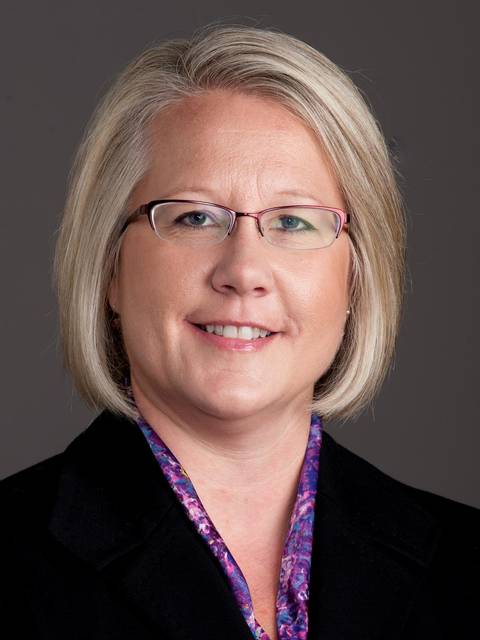
Dr. Julie Anderson
Along with research opportunities, the program promised additional events and Mayo interaction to give the students high-level exposures to the totality of health care. Program organizers like Dr. Julie Anderson work to design fresh hands-on experiences for the Biomedical Innovator students.
“The BI Scholar program continues to evolve as we get feedback from students, our Mayo colleagues and faculty on how to best support the mission of the program,” says Anderson, professor of biology and director of the Health Careers Center at UW-Eau Claire.
“One great event was a ‘Lunch and Learn’ session led by emergency responders from Mayo Clinic Health System. They simulated an emergency response and showed the equipment and the technology currently used. It was a fantastic opportunity for students to see the incredible health career opportunities in biomedical engineering, imaging technology and IT support.”
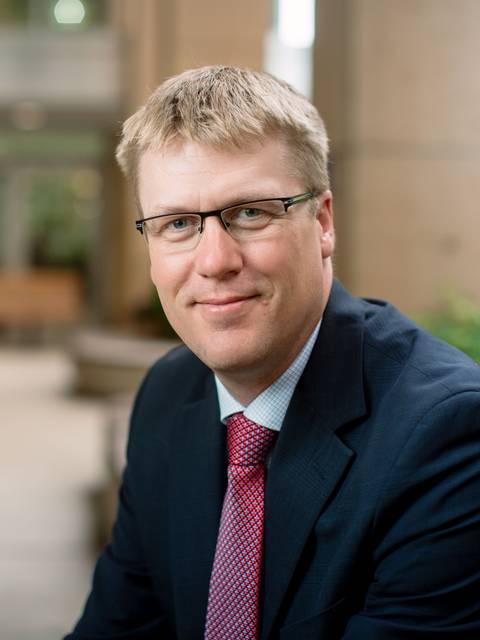
Dr. Tim Nelson, director of innovation for Mayo Clinic Health System Northwest Wisconsin
A key founder of the Blugold Biomedical Innovator Scholars program was Dr. Tim Nelson, director of innovation for Mayo Clinic Health System in Northwest Wisconsin and a UWEC alumnus. Nelson says he is “overjoyed” to see this initial cohort complete the program, their degrees and take their next steps in contributing to what he calls “the biomedical ecosystem,” which is much in need of creative thinkers.
“Of all the things I’ve been lucky to do in my career, I think I may be most proud of helping to launch this Biomedical Innovator Scholars program. It’s so fulfilling to see this first cohort graduate — they represent the future and the potential for change in our health care system.”
“I know them all at this point, and their fresh perspectives and entrepreneurial spirits will fuel their drive to be problem-solvers in establishing a holistic health care system that not only delivers the best in medical outcomes, but is also equitable, fair and cost effective," Nelson says.
“These young researchers have already shown us they are ready to innovate, and where they go from here will be very exciting to see.”
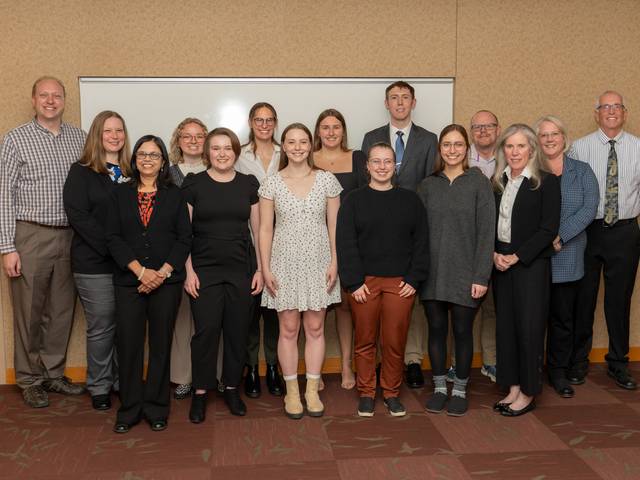
The biomedical research scholars and mentors at April Mayo celebration
From left: Drs. Carter, Glogowski and Hati; biomedical scholars Kira Haus, Grace Cunningham, Mikayla Hady, Saige Tichy, Maya Frodl, Gillian Rossmann, Marshall Apps and Quinn Petersilka; and Drs. Matthews, Mayne, Anderson and Carney.
Meet the inaugural Blugold Biomedical Innovators and learn about their experiences and next steps.
Marshall Apps
Biochemistry/molecular biology and Spanish majors
Green Bay
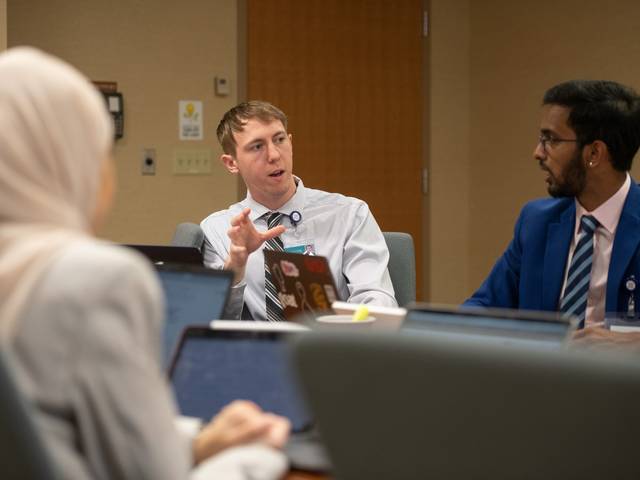
Group research discussions
Along with formal research presentations, Blugold BI students like Marshall Apps were invited to spend a day at Mayo in April 2023 discussing biomedical research with fellow undergraduates from across the nation attending the NCUR conference at UWEC.
It is evident talking to Biomedical Innovator Scholar Marshall Apps that he is an enthusiastic researcher who enjoys sharing his knowledge and experiences, something he says he learned from faculty like his research mentor Dr. Elizabeth Glogowski, Ramsey research professor of materials science and biomedical engineering.
“Our faculty are passionate about their research and want to bring students in. I swear, Dr. G. could talk about materials science forever,” Apps says. “I’m sure I get my passion for the subject from her.”
After spending four years in Glogowski’s lab developing injectable foam for insulating healthy cells during cancer treatments, Apps is visibly excited about the potential of the team’s work.
“This is groundbreaking stuff. It’s amazing to be part of a project with such an important impact on future patients,” Apps says.
“This injectable foam will someday get patients out of the hospital faster and lessen their pain — that is huge.”
What Apps says surprised him the most of his BI program experience is just how much he sees his research impacting his overall thinking and approach to problems.
“Dr. G., Dr. (Jeremy) McBride from Mayo and this whole experience have taught me to step back and look at a problem more systemically. Like an experiment, all problems present setbacks, they require reflection and analysis, they can withstand trial and error, and they often need a whole new approach.”
Apps plans to become a physician and will apply to medical schools for fall 2025. While he is undecided on a specialty, his opportunities to shadow Mayo clinicians have given him a leg up in narrowing down the options in his future.
“Some of my favorite memories in the program have been getting a close-up look at a day in the life of a neurologist, an ER doctor, a pediatrician, an orthopedic surgeon, a cardiologist — we were lucky to get a good taste of our future. That just doesn’t happen anywhere else.”
Grace Cunningham (Member of 2021 cohort, graduating in three years)
Chemistry/biochemistry major
Maple Plain, Minnesota
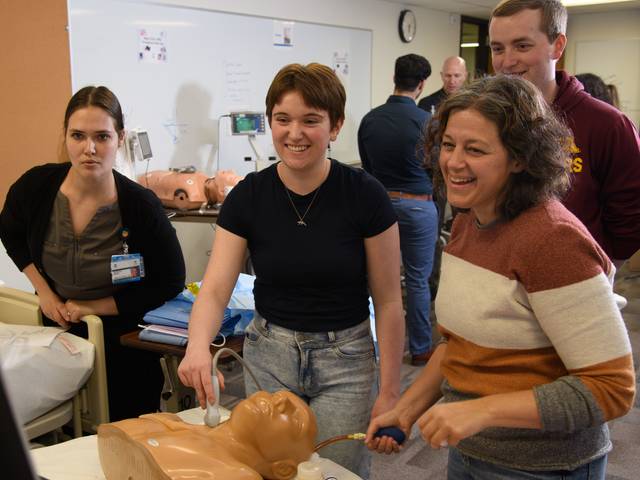
Procedural Skills Clinic
Grace Cunningham had the rare undergraduate opportunity to attend several procedural skills clinics conducted by Mayo practitioners, events giving biomedical scholars and nursing students hands-on experiences with devices and key medical procedures.
Not all our Biomedical Innovator scholars remain on the same project for their time in the program, but for chemistry/biochemistry major Grace Cunningham, three years on the foam project in Glogowski’s lab was a way to deepen the impact of her overall research experience.
“It was rewarding to see some of the longer-term results of my work when staying on the project for all of my time,” Cunningham says. “I also developed close relationships with other researchers and with Dr. Glogowski, which have been incredibly valuable.”
Cunningham says moving on to next steps in her life is exciting, but that walking away from a team and project that have been so pivotal to her college experience will be hard.
“I will definitely miss being part of this team, and I will be sure to check in and see where things are with the project down the road,” she says.
“In a sense, research is never really done — there’s always more to discover and more to learn. So mostly, it’s just rewarding to know that I was able to be a part of this and others will continue furthering that work.”
Cunningham says she is grateful for all of the hands-on experiences that the BI program offered, along with the tremendously powerful research experience, but adds that some of the soft skills having to do with teamwork are just as valuable for her future.
“The biggest lesson I’ve learned is how to bounce ideas back and forth with peers.”
“Knowing how to collaborate and come up with novel ideas together is incredibly valuable,” Cunningham says. “Dr. Glogowski provided fantastic learning support and ideas, while also letting us work together and brainstorm, and bring our own skills and ideas to the table.”
Gillian Davis
Biology major
Ellsworth
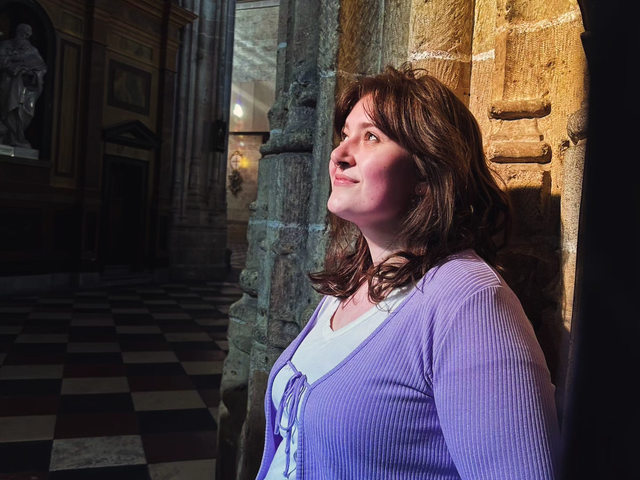
Global education goals
The last semester of Gillian Davis's final year has been spent on a study abroad experience in Spain, where she has been working to improve her Spanish language skills. While away, she has had the chance to visit Prague, Paris, Italy and Croatia.
College-level research can be intimidating for any student. For first-generation student and Blugold Biomedical Innovator Scholar Gillian Davis, the intimidation level felt especially high.
“Nobody in my immediate support circles knew anything about scientific research, or even about college in general, so I was very nervous,” says Davis, adding that she walked into her first lab meeting “scared out of (her) mind.”
“What I learned about research through this program is that the scariest things about it — the total unknown and inevitable failures — are also what is so amazing about research.”
“The excitement for the challenge of discovery never goes away; we just get better at the whole process as we learn.”
Davis spent four years studying prenatal stress and neurodevelopment of autism in collaboration with Dr. Bradley Carter, assistant professor of biology, and Mayo clinician Dr. Ashley Holland.
“Through my connection with Dr. Holland, I was able to work on a Mayo pilot study bringing a specific treatment directly into homes of rural patients with autism spectrum disorder,” Davis says. “It was a great opportunity to see the clinical side of research.”
Davis says she is grateful for the experiences and financial support that the Blugold Biomedical Innovator program provided and is equally grateful for the mentorship and support from Carter.
“He was a guide not just for research, but for academic and professional life,” Davis says. “The faculty mentors at UW-Eau Claire genuinely care, and for me it was a built-in support system from the start.”
Davis plans to work in biomedical research for a few years before applying to medical schools, as she says she has so enjoyed the work that she may consider a research career.
“Research is all about trial and error, which can be frustrating at times, but it is an invaluable experience that has changed the way I think and view the world,” Davis says.
Maya Frodl
Biology major
Racine
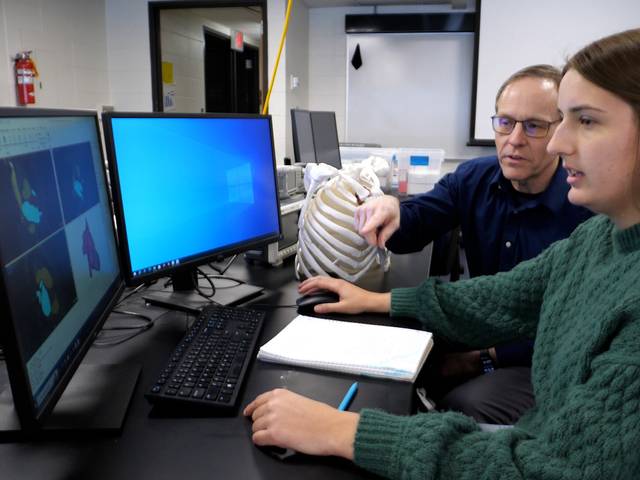
Improving surgical outcomes
Maya Frodl worked for years with Dr. Doug Dunham in the creation of 3D models based on digital scans of real patients' anatomy. These models are used by surgeons to better prepare for the latest and less-invasive surgical procedures.
Maya Frodl says that when she learned about UW-Eau Claire’s Bugold Biomedical Innovator Scholar program, there was “no way” she wasn’t going to apply, even though it was a brand new, untested program.
“For this first cohort of the BI program, not only are we doing research, but we’re also the subject of research — our experiences have been studied as our leaders look for ways to improve the program,” Frodl says.
“I think it’s always a little nerve-wracking to be the first to do anything.”
Frodl enjoyed the program “extras,” the out-of-the-lab experiences presented in collaboration with Mayo Health System. She says that one particular “extra” at Mayo Clinic-Eau Claire during the National Conference on Undergraduate Research (NCUR) made a huge impact on her.
The event arranged for NCUR students was called “Behind the Red Line,” an opportunity for students to take part in a simulation of the “red line,” which is the emergency room protocol for transferring patients from ambulance and EMT care to the trauma bay of the hospital emergency room.
“We were each paired with a specific member of the trauma team and watched their unique role in that very high-stakes process,” Frodl says. “I was paired with an ultrasound technician, and I got to conduct a scan of a (simulated) patient’s abdomen and check for signs of internal bleeding.”
Beyond the details of what each team member observed during the simulation, Frodl says the entire exercise drove home for her the intense atmosphere of camaraderie and trust between all the actors working to save a patient.
“They all know their part and worked together seamlessly. That experience really strengthened my desire to pursue a career in medicine,” Frodl says.
Mikayla Hady
Biochemistry/molecular biology major
Springfield, Illinois
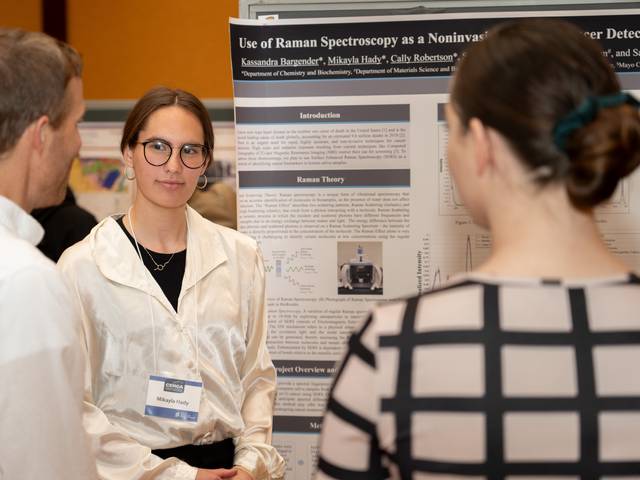
Presenting research at CERCA 2024
Another valuable experience gained by Mikayla Hady and her fellow BI scholars has been multiple options over the years to present their research to both professional medical and general audiences, building important communication skills.
As an 8-year-old, Mikyla Hady wrote a letter to the American Lung Association after the death of her grandmother because she wanted to learn everything she could about the disease.
A decade later, as part of the Blugold Biomedical Innovator Scholars program, Hady had the opportunity to be part of three different research projects in collaboration with Mayo Clinic Health System, including cancer research.
“On my graduation day, I’ll be thinking of that little girl and how proud she would be to know that she would do cancer research as a college student,” Hady says. “This amazing scholarship led me to experiences and connections I could never have dreamed of; I’m very grateful.”
Hady says it still feels a bit “surreal” when she reflects on her many undergraduate biomedical research experiences, including a summer internship at the National Institutes of Health in Washington, D.C.
For the last two years in the lab of Dr. Sanchita Hati, professor of chemistry and biochemistry, Hady has worked on a project that seeks to pinpoint differences between different types of cancer cells versus healthy cells in reaction to light, data that could be used to create new diagnostic techniques.
“Chemistry research can be hard to explain to people,” she says. “But everyone has been touched in some way by cancer.”
“It’s nice to be able to simply say that we are working to make cancer diagnosis easier, quicker and better. Everyone can immediately see the value in that.”
Hady plans to pursue an M.D./Ph.D. in otolaryngology, a focus on the ears, nose and throat.
“I want to continue to conduct research within this medical specialty,” Hady says. “I have also thought about someday becoming a professor.”
Kira Haus
Biomedical engineering major
Elk River, Minnesota
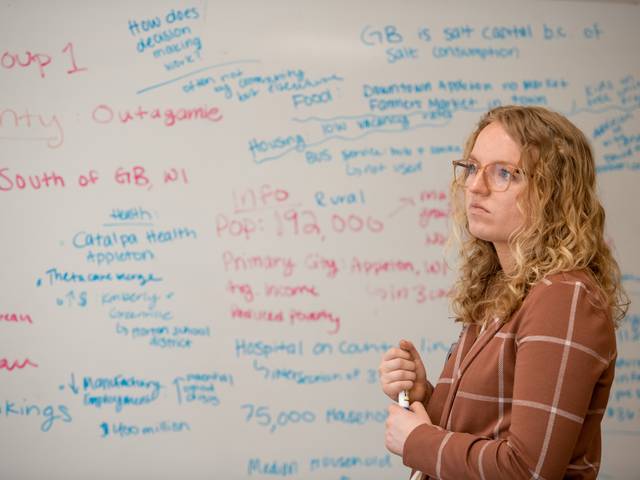
Sharing exciting foam research
As a team member on one of the more widely known BI scholar projects, Kira Haus has become a student expert in therapeutic injectable foam, findings she was able to share with others at the Mayo-hosted NCUR event in April 2023.
When Kira Haus toured UW-Eau Claire, she was working as a certified nursing assistant and had plans to follow a pre-physical therapy track as a psychology major in the Biomedical Innovators Scholars program.
“I had always felt that direct patient care was my passion, but once I got involved in biomedical engineering in Dr. G.’s lab, I knew that was going to be my career,” Haus says.
All four years of Haus’ research program experience were spent with Dr. Elizabeth Glogowski on the development of injectable therapeutic foam designed to protect healthy organs and tissue during treatment of tumors using freezing or heating techniques.
While Haus says it was daunting to walk into that lab for the first time as “just a high school graduate,” set to work alongside experts with Ph.D.s, she says it did not take long to feel at ease and capable of contributing to the goals.
“Once I saw the respect that Dr. G. has for her students and how much she wants us to succeed, it soon started to feel more like we were all just a bunch of science nerds working together to figure out how it all works,” Haus says.
Following Glogowski’s advice never to pass up an opportunity, Haus dove into the work without really knowing how to do it but trusting the process and her mentors.
“After getting the hang of how to run experiments and collect the data, I realized quickly that the experts truly did respect my knowledge about my part of the work — that felt super cool.”
After graduating, Haus plans to enter the biomedical engineering industry.
“I hope to work in medical device development, creating new technology for use in clinical trials or by physicians in direct patient care.”
Quinn Petersilka
Communication sciences and disorders major
Eau Claire
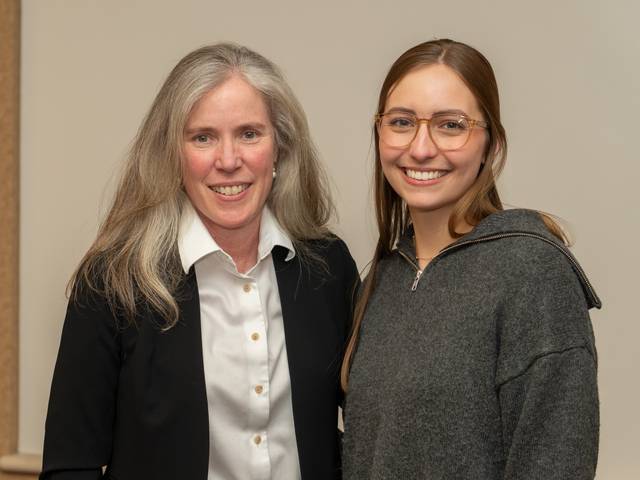
CSD research team
Quinn Petersilka spent the bulk of her time in the BI program conducting research with Dr. Lesley Mayne in communication sciences and disorders with a focus on audiology that has prepared her for graduate school in that field.
No two Blugold Biomedical Innovator Scholars have had the same experiences in this unique undergraduate program, but all have agreed that the mentorship of the Blugold faculty has been unwavering, even when a student has elected to move their research goals out of one lab and into another.
“I started this program in a neuroscience lab with Dr. Doug Matthews, examining the effects of alcohol use on the aged population. After one year, I felt that pursuing a research project based in my department of CSD would be better for me, and Dr. Matthews helped make that happen.”
Matthews facilitated mentorship for Petersilka with Dr. Lesley Mayne, associate professor of communication sciences and disorders.
“Dr. Matthews has remained a huge support, he wrote letters for my graduate school applications and he showed me a great example of our faculty always wanting what’s best for the students.”
Looking back, Petersilka says the lab data analysis skills from the neuroscience lab will always serve her well, and with Mayne she has acquired more research skills to ensure success in graduate school.
“I now have loads of experience in things like review board approval requests for working with human subjects, literature reviews as the basis of a research process, along with poster creation and presentation skills.”
Petersilka will not be waiting long to use those skills, as she has been accepted at the University of Iowa and set for fall 2024 to begin her Ph.D. program in audiology, the study of hearing loss and vestibular issues.
“I feel very well prepared,” Petersilka says. “My degree and the experiences of the Biomedical Innovator Scholars program have set me up very well.”
Gillian Rossman
Neuroscience major
Valparaiso, Indiana
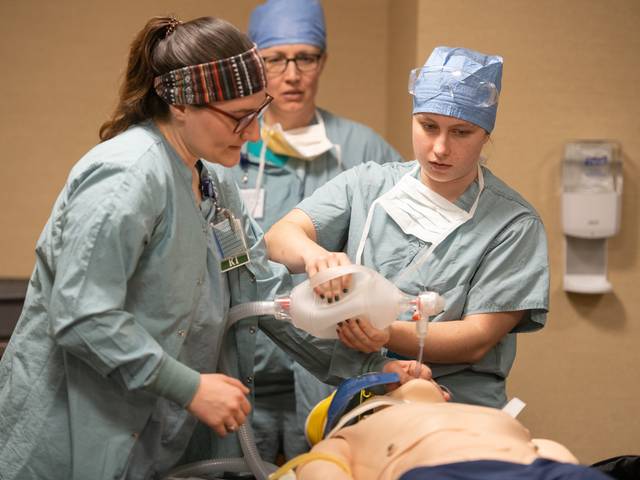
"Behind the Red Line"
A standout experience for seven of the biomedical scholars was the 2023 invitation to take part in a trauma bay simulation at Mayo Clinic in Eau Claire, where Gillian Rossmann is seen here being instructed on performing an intubation procedure.
Not many undergraduates can enter their name in Google Scholar and find five results of published peer-reviewed journal articles, but that’s what graduating neuroscience major Gillian Rossmann can find under her name.
“I was excited for the opportunity to conduct collaborative research,” Rossmann says. “I never thought I would present my research at a national conference or become published five times, but here I am today.”
As a Blugold Biomedical Innovator Scholar, Rossmann has been on a team of student researchers in the lab of Dr. Doug Matthews, professor of psychology, in collaboration with Dr. Doo-Sup Choi from Mayo Clinic-Rochester. The lab studies various elements of the effects of alcohol use, particularly the neurobiology of alcohol effects in aged populations.
Rossmann says that the learning curve on collaborative research was manageable thanks to a steady stream of help from both upperclassmen in the lab and ongoing technique development sessions as a group. As she moved up the ranks in the lab, she says the opportunity to mentor incoming research students was enjoyable and rewarding.
“It’s great to see new lab members grasp new concepts and become interested and invested in the research that I’ve been doing for years.”
After taking a gap year in studies, Rossmann plans to pursue a Ph.D. in neuroscience with an emphasis in therapeutic sciences.
Saige Tichy
Biochemistry/molecular biology major
Stratford
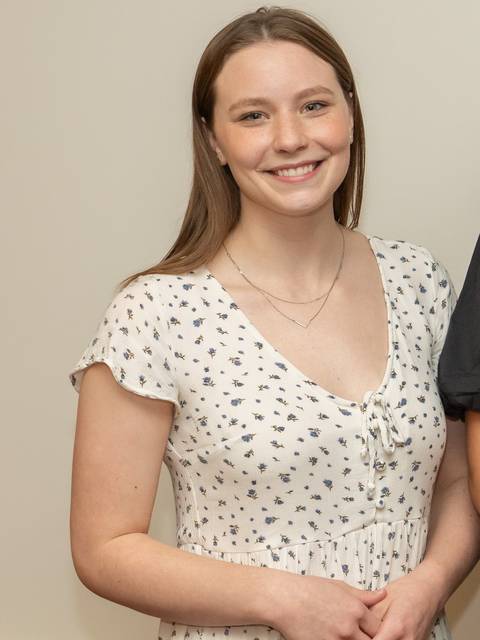
Impressive first job as a new grad
Saige Tichy, a December 2023 graduate, is currently working at Mayo Clinic-Rochester as a research coordinator.
The 2020 cohort of Blugold Biomedical Innovator Scholars did see one early graduate, Saige Tichy, who completed her degree in December 2023. And if Tichy’s current employment is a bellwether for future grad prospects, there are good things on the horizon.
“I am an associate clinical research coordinator (CRC) at Mayo Clinic-Rochester,” Tichy says. “Having done not only research, but research partnered with Mayo Clinic, made me a very competitive applicant.”
For context, Tichy adds that her fellow new hires in the CRC position worked as research lab technicians or scheduling aides for years at Mayo before being considered for the CRC position.
“The BI program at UW-Eau Claire is producing highly competitive applicants for research positions,” she says. “I was also encouraged to apply for a business project management job based on what a recruiter overheard of my three years of lab team management. It’s remarkable, well-rounded experience.”
Tichy conducted research with Dr. Doug Dunham in creating 3D-printed models for use in the presurgical process of the mini-thoracotomy aortic valve replacement program at Mayo Clinic. Their Mayo Clinic collaborator was Dr. Joseph Wildenberg.
“As a senior, I managed our group of seven innovator scholars, oversaw work timelines, submitted grant proposals, wrote conference abstracts and set up all team meetings among ourselves and those with Dr. Wildenberg,” Tichy says.
“The breadth of experience for an undergraduate in the biomedical innovator program would be incredibly difficult to find at any other university.”
“Research was a cornerstone of my life at UWEC, and I have every intention of continuing to be an innovator long after my experience as a Biomedical Innovator Scholar at UWEC.”
Tichy will begin medical school applications next month and hopes to enroll at a top research university.
